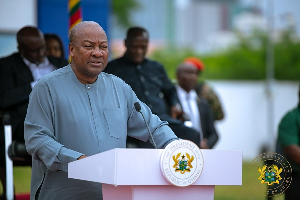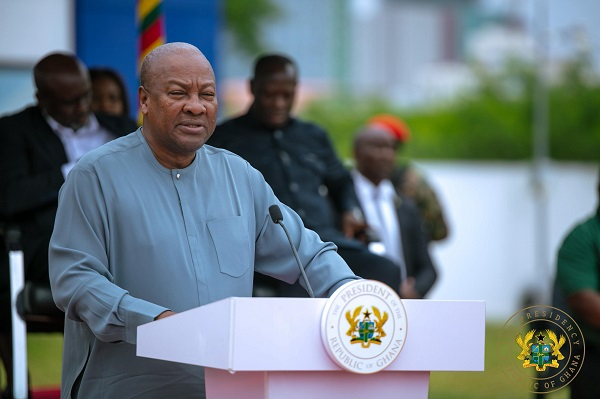 John Dramani Mahama is the President of Ghana
John Dramani Mahama is the President of Ghana
The 2025 Mid-Year Budget Statement presented by President John Dramani Mahama has been met with widespread optimism across Ghana, with the Volta Region standing out as a clear beneficiary of the government’s renewed development agenda. Within just six months of assuming office, the Mahama administration has signalled a decisive return to infrastructure-led growth, community resilience, and regional equity. These pillars are already shaping the future of Volta.
From long-neglected roads to vulnerable coastlines and underdeveloped markets, the government’s interventions are being received not merely as budget allocations but as evidence of leadership committed to results.
Roads That Reconnect and Unlock the Region’s Economic Arteries
Among the highlights of the budget is the rollout of major road rehabilitation projects. Work has officially begun on the Ho to Kpetoe, Kpetoe to Afiadenyigba, Afiadenyigba to Penyi, and Penyi to Aflao roads. These routes are more than just passageways. They are economic arteries that link farming communities to markets, students to schools, and small enterprises to opportunity.
Transport operators, traders, and residents have long suffered the consequences of these deteriorating roads, ranging from high vehicle maintenance costs to limited access to healthcare and education. Now, with construction equipment moving in and timelines announced, expectations are high that these roads will transform mobility and commercial exchange across the region.
Regional development experts believe the strategic positioning of these projects is no coincidence. “The selection of these road networks demonstrates a clear understanding of the economic geography of Volta,” says urban planner Dr. Elikem Ganyo. “It shows that the government is not only spending but targeting its investments wisely.”
Protecting the Coastline through Prevention and Resilience
Another major policy action already in motion is the Coastal Defence Project. Coastal communities in the Volta Region, especially in the Keta, Anloga, and Ketu South areas, have endured the brunt of tidal waves and sea encroachment for years Entire neighbourhoods have been submerged or displaced, with little more than emergency relief offered in the past.
The Mahama government is now taking a long-term approach by launching coastal reinforcement works designed to protect lives, property, and livelihoods. This move aligns Ghana with international standards on climate adaptation and disaster risk reduction.
Community leaders, while cautiously optimistic, have welcomed the initiative as a step in the right direction. “For once, the state is acting before disaster strikes. That is a change we have prayed for,” remarked Torgbui Azaglo, a traditional authority from the Anlo enclave.
Aflao Modern Market as a Boost to Informal Economies
Also included in the budget is a landmark investment. Thirty million dollars has been allocated for the construction of the Aflao Modern Market. Aflao, a border town known for its vibrant informal economy, has long operated with limited infrastructure despite its strategic location.
The new market is set to include modern stalls, warehouses, improved sanitation facilities, and digital infrastructure to support financial inclusion and logistics. For hundreds of women in the informal sector, the project is expected to increase earnings, reduce operating risks, and attract cross-border trade.
“Markets like Aflao’s are not just commercial spaces. They are social systems,” said Professor Yaa Ansah, a development economist. “When you upgrade them, you are upgrading lives.”
Beyond Promises: A Government Taking Action
Unlike in previous administrations where announcements often stalled at the planning stage, the current wave of development is marked by action. Bulldozers, engineers, and surveyors are already on the ground. Contracts have been awarded, funds secured, and oversight mechanisms installed.
This swift execution has not gone unnoticed by civil society. Several local groups have commended the government for reducing bureaucratic delays and building trust through transparency and speed.
In a public statement, a coalition of youth organizations in Volta described the budget as “a breath of fresh air and a credible roadmap to reclaiming the region’s development potential.”
Looking Ahead
As Ghana navigates its economic recovery, the Volta Region is emerging as a symbol of what focused governance can achieve. Whether in infrastructure, climate resilience, or local economic empowerment, the signs are clear. This administration intends to bridge the development divide with urgency and purpose.
The challenge ahead will be to maintain the momentum, ensure inclusiveness, and deliver quality that matches the scale of investment. But for now, the Volta Region is not just hopeful. It is mobilized, engaged, and ready to partner with government to build a new chapter of progress.


